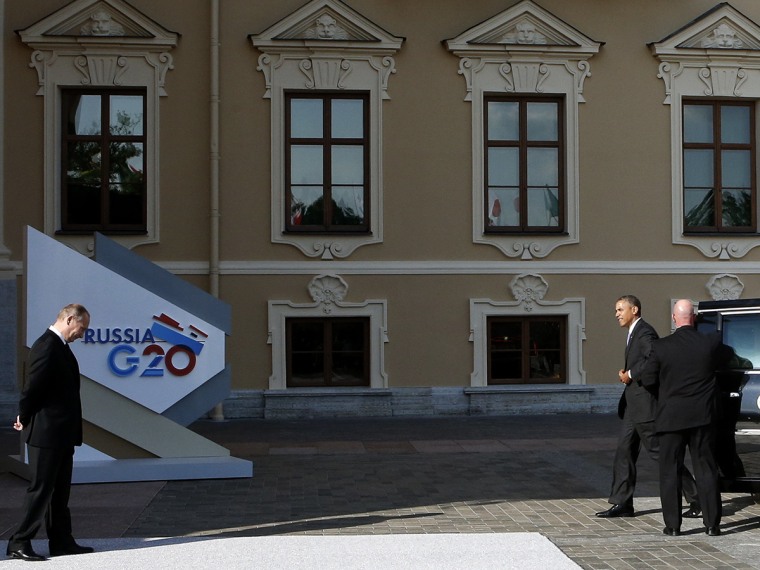President Obama might face a chilly reception from more than just Russian President Vladimir Putin at the G-20 summit this week in St. Petersburg. The documents leaked by National Security Agency contractor Edward Snowden sparked an international outcry over U.S. spying among the very leaders Obama is urging to back him on military strikes in Syria.
A Brazilian news program reported Sunday that the U.S. spied on the leaders of the two largest nations in Latin America: Brazil’s Dilma Rousseff and Mexico’s Enrique Peña Nieto. The information comes on the heels of reports that the U.S. bugged the video conferencing system at the United Nations headquarters in New York City. And earlier this summer, a batch of leaked documents revealed that the U.S. allegedly spied on civilians throughout Latin America.
Brazil fired back at the U.S., with foreign minister Luiz Alberto Figueiredo calling the recent disclosure “an inadmissible and unacceptable violation of Brazilian sovereignty." The country demanded a formal response from the U.S. by the end of the week.
The dust-up comes in the lead-up to a White House State Dinner for Rousseff on Oct. 23, Brazil’s first such reception by the U.S. government in two decades and President Obama’s only scheduled state dinner this year. At the long-awaited showcase of renewed diplomatic relations and Brazil’s rising economic status, the two leaders are set to discuss mutual commercial interests, such as a possible $4 billion jet-fighter deal. But now, will Rousseff attend?
“We understand how important this is to the Brazilians,” deputy national security adviser Ben Rhodes said en route to the summit, acknowledging that Obama and Rousseff are likely to discuss the spying allegations. “We carry out intelligence like just about every other country around the world. If there are concerns we can address, consistent with our national security requirements, we will aim to do so.”
The White House confirmed that Obama and Rousseff met between the first session of the summit and Thursday evening's formal dinner.
Also attending the summit is Mexican President Peña Nieto, another reported target of the surveillance. While the Mexican Foreign Ministry issued a stern statement saying that the government “rejects and categorically condemns any works of espionage against Mexican citizens in violation of international law,” the release did not call out the U.S. for spying on Peña Nieto personally.
It is against this backdrop that Obama is attempting to rally support for military strikes in Syria.
The spying allegations aren't likely to help Obama curry favor this week in St. Petersburg, and although the G-20 is convened as an economic summit, the 30-month-old civil war in Syria threatens to overshadow economic interests as the world grapples with evidence that Syrian President Bashar al-Assad used chemical weapons against his own people. According to a U.S. intelligence assessment, the attack on Aug. 21 killed nearly 1,500 people, including more than 400 children.
Though Syria is not on the formal agenda, Obama administration officials said they expected discussion to occur “on the margins.” In his opening remarks, Putin said some attendees had asked to discuss “very acute topics of international politics, in particular the situation around Syria.”
"I suggest we do this during dinner so that we... in the first part can discuss the [economic] problems we had gathered here for,” Putin said.
Boasting the world’s most powerful developed and developing economies, the G-20 roster is also home to the world’s most powerful militaries. Having set a “red line” against chemical weapons use in Syria last summer, Obama is now charged with defending it.
"I think that the president will find himself reasonably isolated in St. Petersburg," Charles Kupchan, a senior fellow at the Council on Foreign Relations, "particularly because he is trying to sell a military attack on Syria in a forum in which there isn’t a great deal of sympathy for the mission."
"There’s no uniform position [among the member nations], but I think it’s safe to say that the center of gravity in the G-20 will not be with Obama," Kupchan said.
Furthest away from Obama's position is his host, Putin, who has repeatedly used his veto power in the five-member U.N. Security Council to block any action against the Assad regime. Putin is publicly calling into question the evidence presented by western nations showing Assad’s culpability in the Aug. 21 attack, invoking the specter of the failed evidence presented in the lead-up to the Iraq War.
Obama canceled a planned visit to Moscow ahead of the G-20 summit, and administration officials have repeatedly ruled out the possibility of a one-on-one meeting with Putin while in St. Petersburg.
Alongside Russia, China has voted down lesser moves to block Assad’s progress in the Security Council.
“Military action would have a negative impact on the global economy, especially on the oil price,” Chinese Vice Finance Minister Zhu Guangyao said Thursday.
In a stunning blow to British Prime Minister David Cameron last week, the British House of Commons voted against a preliminary measure designed to pave the way for military action. Cameron has said he would urge support through international channels, like the U.N., during the G-20 summit.
The United Nations announced Thursday that Lakhdar Brahimi, the special envoy of the U.N. and the Arab League on Syria, is attending the G-20 summit to rally support for a peace conference in Geneva.
A spokesman for Putin told a Russian news outlet that Putin will not be attending the peace summit.
During Thursday’s daily briefing, State Department spokeswoman Jen Psaki announced support from Australia, Albania, Kosovo, Canada, Denmark, Poland, France, Romania, and Turkey.
“We have enough military support to move forward,” Psaki said. “This isn’t the kind of action that requires significant military support.”
